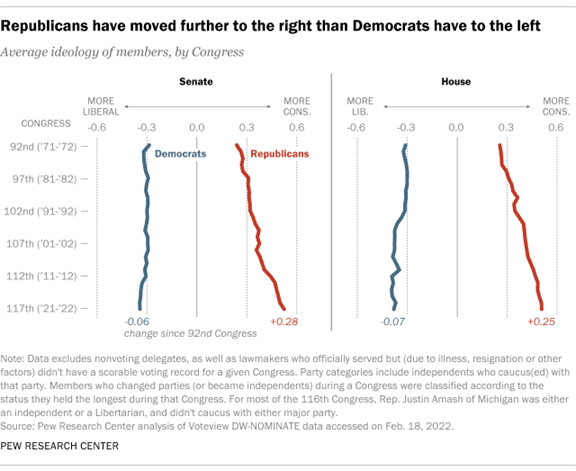Conservative vs. Progressive
Beyond Red and Blue: Navigating the Ideological Spectrum
Do you self-identify as Conservative or Progressive? Have you ever pondered the profound nuances embedded in the dichotomy of progressivism versus conservatism? The differences between the two sides are stark, and, In the vast socio-economic-political arena that is our United States of America, it feels more and more like the ideological clash of between progressivism and conservatism is getting worse. Much worse.
First, did you know that more people in the United States identify as liberal or conservative than as Democrat or Republican? It’s true. According to a 2022 Gallup poll, a combined 62% of Americans identify with either a liberal or conservative ideology, and this trend has been ongoing for several decades.1
- In 1994, 30% of Americans identified as liberal, 45% identified as conservative, and 25% identified as moderate.
- In 2004, the numbers were 33%, 42%, and 25%, respectively, and
- In 2014, the numbers were 38%, 39%, and 23%, respectively.
Interestingly, a growing number of Americans identify as liberal while the percentage identifying as conservative is decreasing. And, as the number of self-identified Republicans dwindle, those that remain are veering more towards the extreme as the chart below illustrates.
What does it mean to be progressive or conservative?
So, these data sets suggest that we Americans are moving away from the traditional party labels of Democrat and Republican in favor of Conservative vs. Progressive. However, what we are not doing is contemplating the meanings of these terms. What is a progressive? What is a conservative?
The Lexical Genesis of the word “Progressive”
The word “progressive”, a noun, is derived from the root word "progress". As per the Merriam-Webster dictionary, the word ‘progress’ encapsulates not merely forward movement but an onward march towards a destination. Progress embodies an advancement towards a better, more complete, or more modern state. Progress is also a verb that beckons us to move forward, onward, and upword in both space and time.2
The Lexical Genesis of the word “Conservative”
The word “conservative”, a noun, derives from the root word “conserve” or “to conserve”, a verb that means to preserve things as they are, keeping things unchanged, even in a pristine state. To conserve is to preserve, protect, and maintain things as they are and as they have been.3
The one point of agreement between Progressives and Conservatives
Amidst the American cacophony, a recent ABC News/Ipsos poll reveals a resounding sentiment—one of disquiet. A staggering 76% opine that the nation veers off-course, a disconcerting chorus. Only a meager 23% perceive a trajectory aligning with their aspirations.4
Conclusion: The Provocative Query
So, dear America, I pass the rhetorical baton to you: Do you crave change, the anthem of progress? Or is it the embrace of conservation, a desire to retain the familiar? The pendulum of choice is swinging now with a greater urgency and amplitude than ever.
The future awaits your verdict…
- Footnote content.
- https://www.merriam-webster.com/dictionary/progress
- https://www.merriam-webster.com/dictionary/conservative
- 3. https://abcnews.go.com/Politics/americans-country-headed-wrong-direction-poll/story?id=104633234
